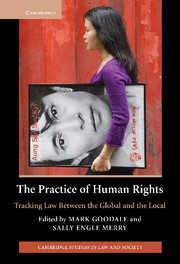Book contents
- Frontmatter
- Contents
- Contributors
- Acknowledgments
- Introduction Locating rights, envisioning law between the global and the local
- PART ONE STATES OF VIOLENCE
- PART TWO REGISTERS OF POWER
- PART THREE CONDITIONS OF VULNERABILITY
- PART FOUR ENCOUNTERING AMBIVALENCE
- Introduction
- 7 Transnational legal conflict between peasants and corporations in Burma: human rights and discursive ambivalence under the US Alien Tort Claims Act
- 8 Being Swazi, being human: custom, constitutionalism and human rights in an African polity
- Conclusion Tyrannosaurus lex: the anthropology of human rights and transnational law
- Index
- References
8 - Being Swazi, being human: custom, constitutionalism and human rights in an African polity
Published online by Cambridge University Press: 29 March 2011
- Frontmatter
- Contents
- Contributors
- Acknowledgments
- Introduction Locating rights, envisioning law between the global and the local
- PART ONE STATES OF VIOLENCE
- PART TWO REGISTERS OF POWER
- PART THREE CONDITIONS OF VULNERABILITY
- PART FOUR ENCOUNTERING AMBIVALENCE
- Introduction
- 7 Transnational legal conflict between peasants and corporations in Burma: human rights and discursive ambivalence under the US Alien Tort Claims Act
- 8 Being Swazi, being human: custom, constitutionalism and human rights in an African polity
- Conclusion Tyrannosaurus lex: the anthropology of human rights and transnational law
- Index
- References
Summary
In 1995, the government of His Majesty, the King of Swaziland, began the process of consultation that would eventually lead to the adoption and implementation of a new constitution for the small African kingdom a full decade later. Each year witnessed an annual increase in international pressure to fill the void left by the previous King when he repealed the Independence constitution by Royal Decree in 1973. And many observers, from both inside and outside of Swaziland, presumed that those committed to the political and legal reforms deemed necessary to end the thirty-two year state of emergency would welcome the document's long awaited arrival into law. Indeed, although probably a vocal minority, self-ascribed political progressives had long hoped the constitutional drafting process might usher in a return to multiparty democracy. Monarchical supporters, on the other hand, clearly envisioned the constitution's adoption in terms of a consolidation of absolute royal power and had engineered much of the consultation and drafting process in this direction. However, in the final months of the document's gestation, the geography of interests around the new constitution proved far more complex than one might have anticipated, and the ambivalence over the “rights” it was supposed to enshrine – and the nation it was said to constitute – proved profound.
This chapter aims to explore some of these “ambivalent encounters” with the Swazi constitution by interrogating the presumptions and prejudices of scale inherent in the perspectives of local and transnational actors involved in the document's realization.
- Type
- Chapter
- Information
- The Practice of Human RightsTracking Law between the Global and the Local, pp. 320 - 341Publisher: Cambridge University PressPrint publication year: 2007
References
- 18
- Cited by

